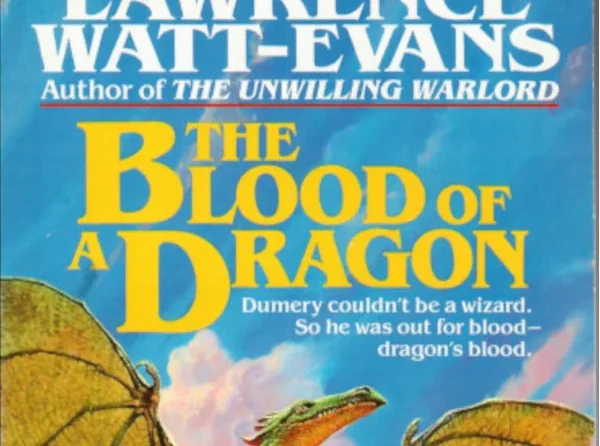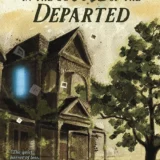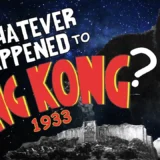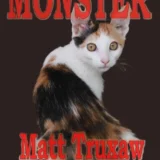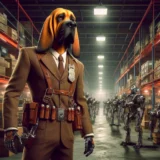
The only sounds aboard Phoenix 3 are the soft hum of ventilation fans and a little muffled throat clearing. In the mess, nobody eats. A tenth of the ship’s complement is there; a hundred hands hold forgotten bags and bulbs and tubes of food and drink. In the microgravity, a hundred butts float gently off a hundred seats, skewed minutely aftward by the feeble ion thrust.
An image occupies every viewing screen: masses of cloud, white shot with boiling storm black, expanding. Rapid, ravenous, reaching; time lapse video of deadly bacterial mats spoiling a delicate aqua and russet fruit, angry orange cigar holes burnt roughly in the ocean, scattered along the edges of paling brown continents with lights dying suddenly in patches from the outside in. A new streak draws itself red and hot in a flash through the thin atmospheric shell and starts a new hole in blue water.
Rising slowly, slowly, agonizingly slowly above the angry roils of cloud, a tiny red pixel glows, disappears, glows again, grows a second pixel, a third. A yellow circle draws itself around the pixels: look here.
Throughout the ship, a thousand pairs of lungs, having forgotten for a surprisingly long time to breathe, suck air.
Then, a thousand people whoop, cheer, pound backs, hug, ricochet from bulkheads, from ceilings, from floors, from each other, laughing, grinning. In the mess, among the bouncing crowd, forgotten food begins to drift aft; the ship’s ion drives slowly bring her lower as she swings around the moon tail-first, orbiting lower, slower, preparing in good, careful time to land beside ancient namesake Phoenix, sitting two centuries cold above the catacombs our ancestors sent robots to build in preparation for colonists to occupy. A colonization that never came, derailed by simple accident, then by global war and the long struggle to rebuild civilization.
“That was Phoenix 99 out of Egypt, folks,” Captain Whitehead eventually says via PA, voice cutting through the ebbing celebration. “Last one out. 100 never got her engines, if you hadn’t heard. Sorry to anyone who knew a 100 passenger. Same for 2,29,52,54, and 72; all lost in launch anomalies.” A cough, a sigh, and her voice is softer. “Ninety-nine launched. Six lost. Better than we expected. Still.” Her voice grows softer still. “Six thousand souls lost. Dead. And all the billions on Earth, soon enough. A moment of silence for them all.”
The fans hum, throats clear.
Soft irregular pats in the mess: food finding the aft wall in a hundredth of a gee.
The silence stretches. Someone tries to bite off sobbing and gasps, chokes. They cry alone: we’ve known this was coming for too long. Since before we were born.
The PA: “Dr. Lucille Mirandez-Larsen to the bridge.”
The moment is gone; I obediently head to the bridge.
“Captain?” I’m not military, but she is. Most of the essential staff on the Phoenixes are. Soldiers of rapidly dying nations. Behind me, someone closes the door as they exit. Dogs the hatch. Whichever.
“Doctor,” Captain Whitehead says, “Call me Shonda, at least while we’re speaking in private.”
“Why?” During the panicked days preparing to launch as asteroid revenge weapons aimed at Earth by two-centuries-dead combatants and their long-cold robot tugs approached their targets, she had insisted on being addressed by her title at all times. I understood why; there had to be a nucleus of order aboard to stave off chaos.
“Because I need your expertise, and I need a favor: for you to keep a secret for a day or two. Not past landing.”
“Why does it stop mattering then?”
“Look.” She sets her tablet on a narrow work table built into one bulkhead. We sit; I look up. The two pilots are busy; another crew works at a station. I arch an eyebrow, not looking at the tablet yet.
“They know,” Shonda says.
…
LUNAR MISSION.
.
Advise number of arrivals please.
.
Welcome.
.
NEW PHOENIX LUNA.
…
“Are we in communication with them? What was your answer?”
“No, and nothing yet. This message was transmitted by laser, using a very simple pre-War text protocol. One of our telescopes caught it. I want to know what you think of it. Could it be automated? Could it represent a trap? The ancients were…violent. Paranoid.”
“So, assuming it’s a trap –”
 “I’m not assuming, I’m worrying. An enclave of ancients, or one of their war machines, is a huge potential hazard to what’s left of humanity. We’re lead ship, our job – not that we thought this particular situation was possible – is to discover and evaluate hazards. We can land as planned and see what happens. Or we can land elsewhere, use Plan B and link the Phoenixes on the surface to form an initial habitat. Or…”
“I’m not assuming, I’m worrying. An enclave of ancients, or one of their war machines, is a huge potential hazard to what’s left of humanity. We’re lead ship, our job – not that we thought this particular situation was possible – is to discover and evaluate hazards. We can land as planned and see what happens. Or we can land elsewhere, use Plan B and link the Phoenixes on the surface to form an initial habitat. Or…”
“What?”
“Plan C, as I see it, is to destroy them so they can’t threaten the success of Plan B. If we think whatever’s talking to us is that dangerous. I need you to help me figure it out; I remember your PhD focused on pre-War space projects. Yes?”
“Yes. But…we’re armed?” The world wasn’t without conflict; I was pretty sure humanity couldn’t exist without some form of warfare. But the history we’d grown out of had left us as a species wary of large weapons and organized conflict. The Phoenixes Project was meant to be unarmed.
“No. We’re not armed.”
“Then how…oh. No. No.”
“Our thousand lives would be an acceptable price to pay for the safety of the other ninety-two thousand human beings,” Captain Whitehead – Shonda – said, voice soft as it had been over the PA before. “I need your perspective as a historian, Doctor, to help me make the decision.”
“I have to talk to them.”
“You won’t have long. We pass over them in half an hour. You’ll have only a few minutes.”
“I can’t…”
“Do your best.”
#
“Land. There’s no need for Plan C, or even B. We can occupy the colony; they’re evacuating it,” I told the Captain forty-five minutes later. She stared at me, raised an eyebrow to encourage me to go on. “They, their Captain Clinton, tells me the tunnels will probably accommodate the population of half of our fleet. They just let the construction bots keep building new habitat once they got here, hoping they could fill the space. But they haven’t been able to. Lack of genetic diversity – imagine trying to build a population from a base of only a few hundred genomes. And that checks out against the historical record; the original Phoenix mission was to be seven hundred people split between two ships. Only one ever launched.”
“And was thought lost,” Captain Whitehurst said slowly. “How did that come about?”
“No time to ask them, sorry. I had seven minutes to work with. As a historian, I’d have preferred seven hours. Days. Years. They’re a treasure house, those people. Their ancestors lived through the last days before the War, but with no discontinuity of records as we’ve had on Earth. There are so many things we know so little of, of our own past.”
“None of that makes them trustworthy. The ancients were hypercompetitive paranoids. They could have rigged the tunnels with traps, could have…who knows? They were so different. Well. We can slow down, take our time in orbit. We can circle for a few days before it gets too crowded.”
“And I urge you to land the first moment possible,” I said, biting off the last three words.
“What? Why?”
“They’re leaving now, and we have a thousand people aboard. Send us all in, except for a skeleton crew. If there are traps, we’ll find them and you can warn the fleet off, switch to Plan B.”
“But if they laid traps, if they’re lying in some other way that endangers us, I’d be dooming the whole…oh.”
“Right. We’re just as doomed in your last-ditch emergency scenario. More doomed, in fact. Look, all I got from talking to a single one of them for a few minutes was an impression, it would be impossible to get more. We communicated by text format, so I have no body language cues to give me a hint as to the truthfulness of what I was told. I can’t add anything new to aid your decision, Captain, because all I have are a few words that may or may not be true, that I may or may not fully understand; language evolves over centuries. All waiting for this did was push back your decision.”
“But…”
“You’re procrastinating, Captain. You’re afraid to make a decision that could kill a thousand people.” As a student of history, it was a familiar scenario: the leader faced with a perilous and uncertain choice. Leaders who made the wrong choices often doomed thousands, millions, even more during the War times. But the indecisive doomed people just the same; the inexorable advance of time and events made choices for those unfortunates, rarely with happy results. “So make the decision that gives us the greater chance to live. Advise the rest of the fleet to hold in orbit as they arrive and prepare for Plan B. But we both know that Plan B is the more difficult, the riskier choice. A linked mass of Phoenixes on the surface will be cramped and vulnerable to accidents, equipment failures, even severe solar flares. That ancient abandoned colony is still our best bet. Humanity’s best bet. So let us try to occupy it. And if we find it good, call the others to land.”
As Phoenix 2 descended to land beside the smaller, much older Phoenix, a slender thread of flame rose from a dozen kilometers distant, from within a small crater: Captain Clinton, doing as he promised. I wondered why he had made the choice he did. If there were so few of them, why not join us? Perhaps he feared losing his way of life, his culture. And, in time, he would have. Two or three hundred among nearly a hundred thousand were almost certain to.
Captain Whitehurst hadn’t asked, but I was pretty sure where Clinton and his people were heading. “There is room for us beyond the asteroids,” he had messaged; his last line, his farewell. We’d find them among the moons of Jupiter or Saturn, I guessed. Or my descendants would. Plenty of resources there, plenty of room. And a fine view. And perhaps next time our people met, it could be without fear, without flight.
Copyright © 2016 by Stuart Barton. All Rights Reserved.
Artwork Copyright © 2016 by Mary Thompson. All Rights Reserved.

